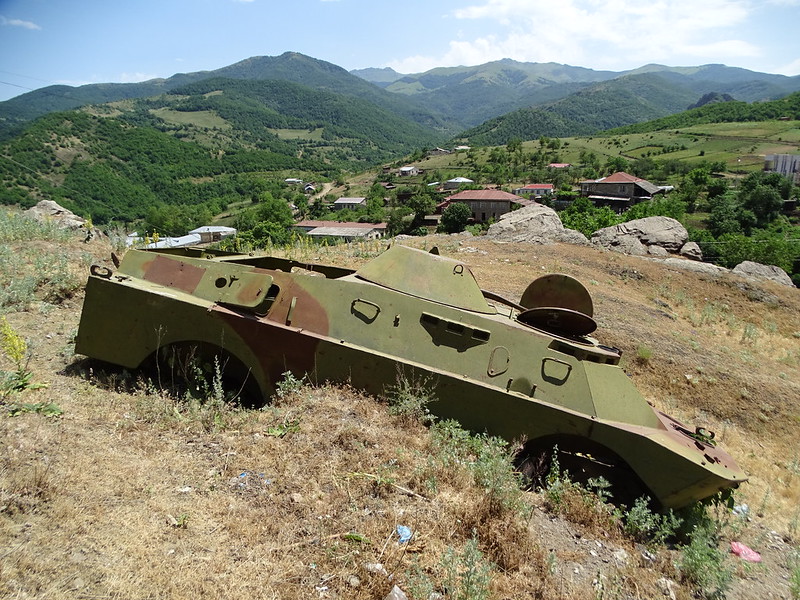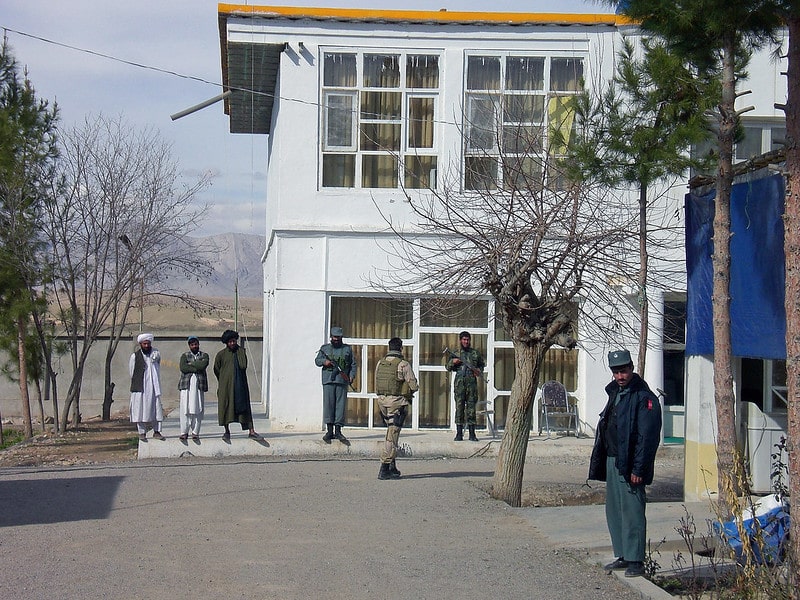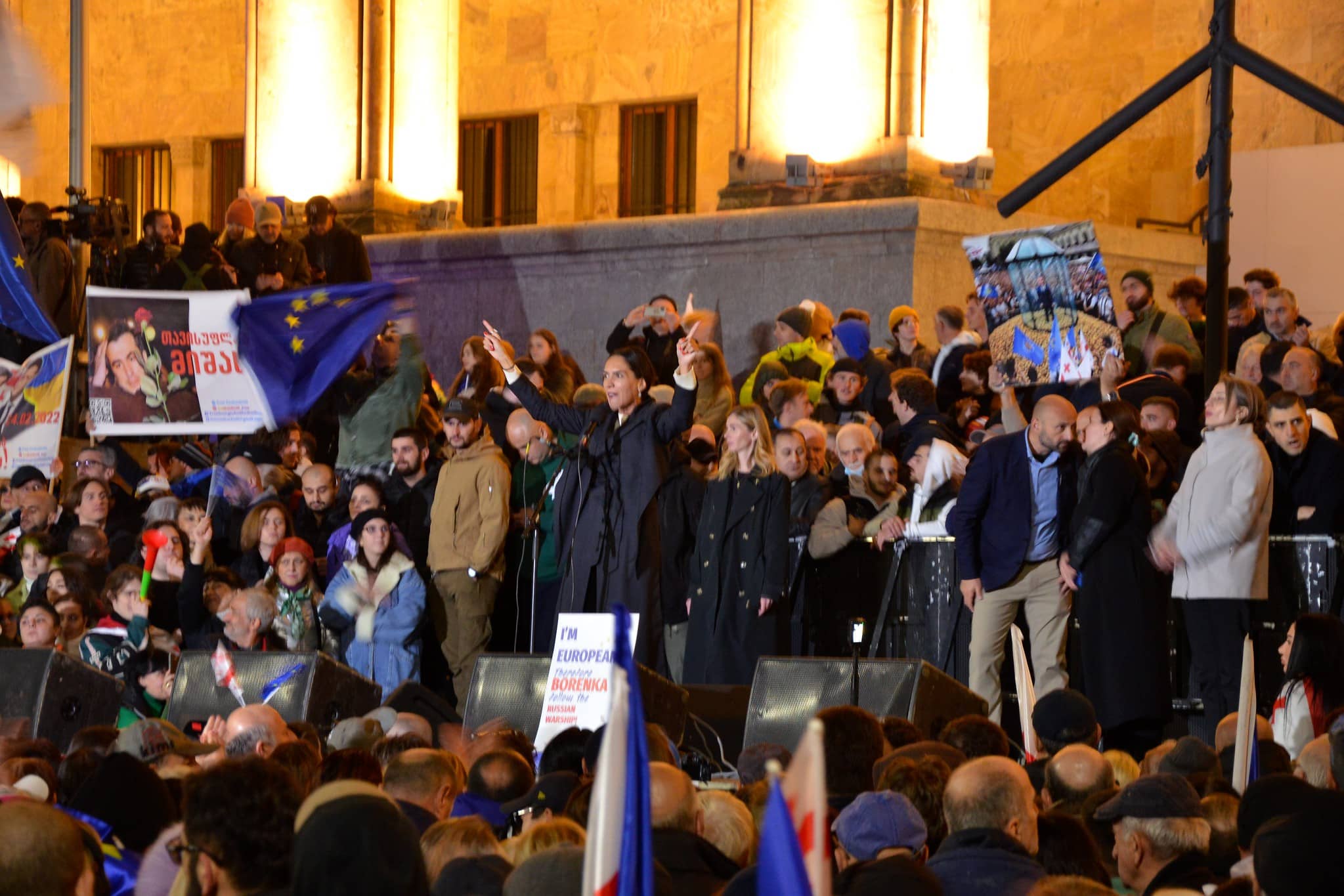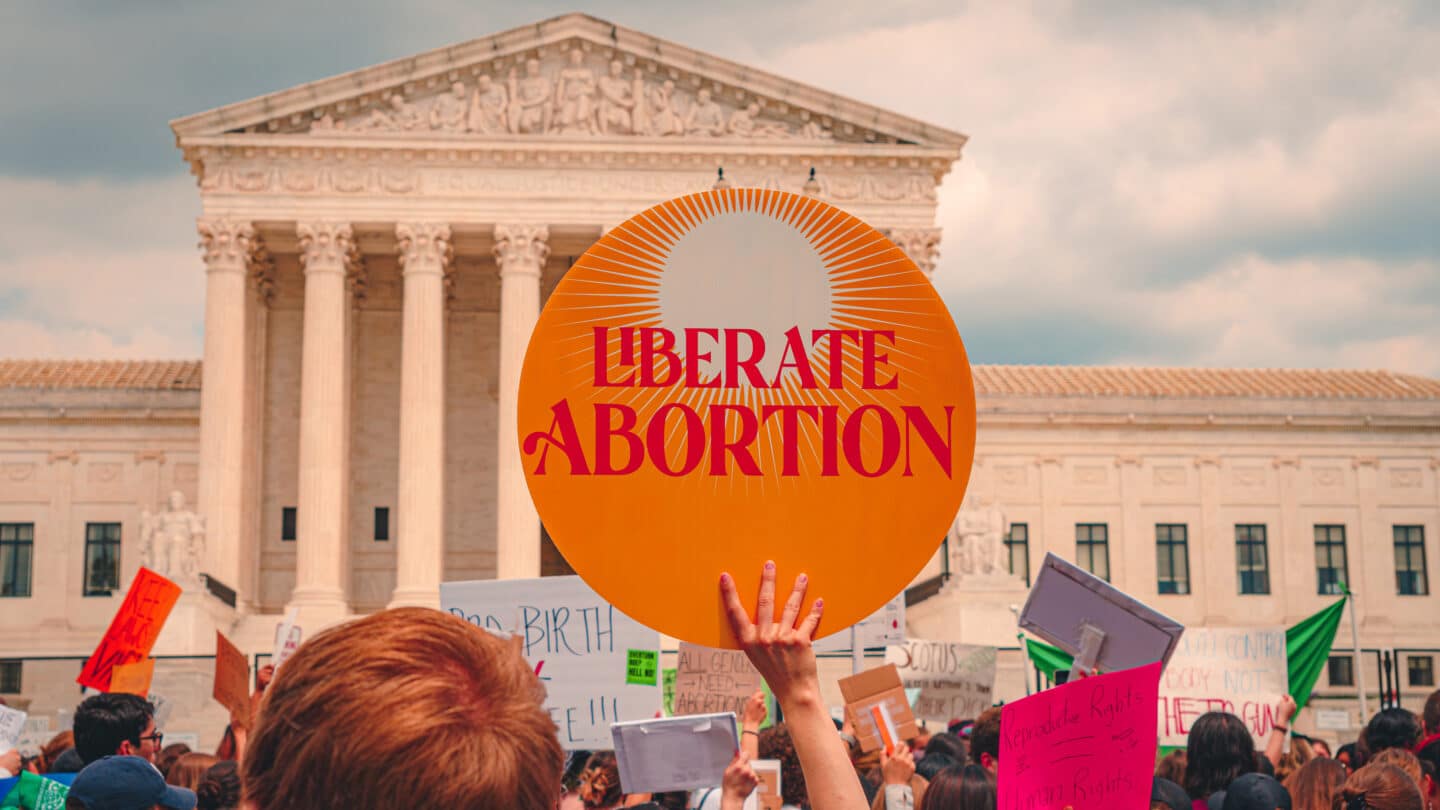Destroyed military vehicle - On road from Shushi to Karintak - Nagorno-Karabakh (Source: Flickr)
Read the English version of this article here.
The International Court of Justice, based in The Hague, has ordered Azerbaijan to ensure the free movement of people and goods to the disputed Nagorno-Karabakh region with immediate effect. It is a new chapter in the deep crisis between Armenia and Azerbaijan. Eco-activists have been blocking the only road to the region - the Lachin highway - since 12 December. We spoke to SD Platform Armenia founder Armen Mkhchyan about the humanitarian situation in Nagorno-Karabakh, the background of these ' eco-activists', geopolitics and the role of the West.
What is the situation at the moment? Is the blockade of the Lachin highway still in full force?
"The only road to Nagorno-Karabakh, the Lachin corridor, is still closed because of the blockade. Families are separated and stuck on one side. Supplies of food and medicine have been cut off by the blockade and there are many shortages - shelves are empty every day. The Red Cross can transfer extremely critical patients to Armenia, but scheduled operations are cancelled because these patients cannot pass through the Lachin corridor. Moreover, Azerbaijan has cut off the gas supply to Nagorno-Karabakh several times, leaving residents without heating during the harsh winter. Schools have therefore been closed several times and children are deprived of education."
"Families are separated and stuck on one side. Supplies of food and medicine have been cut off by the blockade and there are many shortages - shelves are empty every day."
Who are these activists and what are their demands?
"Officially, the activists claim they are protesting for a monitoring mission of Armenia's mining activities in the Nagorno-Karabakh region - claiming that Armenia's mining activities are illegal. Armenia even agreed to an observation mission, but only under the guidance of impartial observers. This was rejected, with the protesters demanding that purely Azerbaijani specialists investigate the area. However, since the start of the blockade, it has been clear that these activists are sent by the Azerbaijani government. These so-called environmental organisations are affiliated with the government in Baku and without Azerbaijan's permission, these protests would never have been possible."
So what might Azerbaijan's broader strategy be?
"That one is twofold. On the one hand, the blockade hits Nagorno-Karabakh's revenues very hard, as mining activities have come to a halt. This puts further pressure on the livelihoods of the citizens of Nagorno-Karabakh. And on the other hand, Azerbaijan wants to pressure Armenia to accept all kinds of conditions in the bilateral peace process, which is coordinated by Russia. For instance, they want a corridor between Nakhichevan (an Azerbaijani enclave, see map below) and Azerbaijan. While Armenia accepts the presence of an Azerbaijani road, it is completely unacceptable to have a parameter around the road, as this is Armenian sovereign territory."
Map of Armenia, Azerbaijan and Nagorno-Karabakh after the 2020 war. Source: Responsible Statecraft
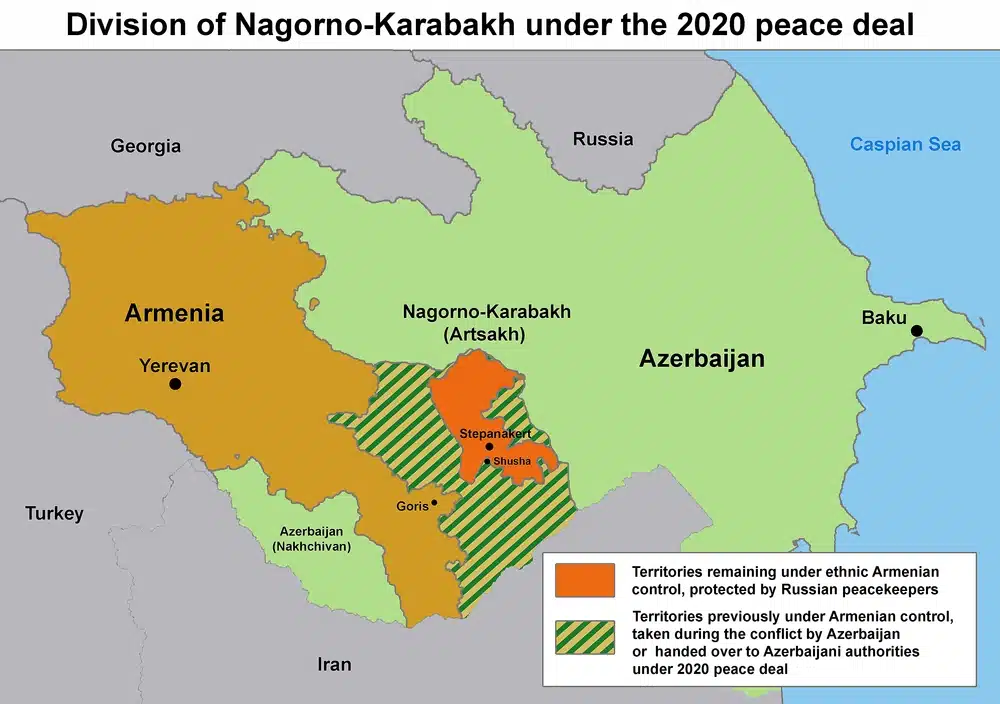 A background: whence these hostilities around Nagorno Karabakh?
A background: whence these hostilities around Nagorno Karabakh?
Both Armenia and Azerbaijan have laid claim to the Nagorno-Karabakh region since the collapse of the Soviet Union. Most residents of the enclave identify as Armenians, and the region has been largely governed by Armenian authorities - the Republic of Artsakh - since the 1990s. Many in the region fear ethnic conflict, which has already occurred in the region during the first Nagorno-Karabakh war (1988-1994). Internationally, most states currently recognise Nagorno-Karabakh as Azerbaijani territory, according to Soviet-era borders.
In a bloody conflict in 2020, Azerbaijan recaptured most of Nagorno-Karabakh. It caused thousands of deaths on both sides. Since then, both countries have been trying to conclude a Russia-led peace process and a ceasefire is being enforced by Russian peacekeepers in the region. However, this could not prevent new hostilities in September 2022, when Azerbaijani forces invaded sovereign, internationally recognised Armenian territories, killing hundreds. As Russian attention shifts to Ukraine, Western powers such as the EU and the US are also trying to mediate in the conflict. The EU recently deployed a civilian mission in the border region between Armenia and Azerbaijan, to the dismay of Russia.
What is the risk of new conflict?
"Azerbaijan is deliberately using 'activists' because it is unclear to the Russian peacekeepers how to deal with them." The trilateral agreement clearly states that the Lachin corridor must at least remain open for transport. This has clearly been violated by Azerbaijan. The Azerbaijani government showed last year that it is ready to use large-scale force against sovereign areas of Armenia. They want all Armenians out of Nagorno-Karabakh by using various tactics. Not for nothing did the Lemkin Institute for Genocide Prevention recently issued a Red Flag Alert for Genocide issued. There are fears in Nagorno-Karabakh that Azerbaijani violence against the Armenian population will flare up again. How can we have a real peace process and talk about coexistence if this is still the case? Azerbaijan is attacking sovereign Armenian land, killing 200 soldiers and injuring many, while also demanding sovereign Armenian lands. In this way, coexistence is far, far away."
And what is the situation in Azerbaijan, is there any opposition to the Aliyev government?
"The propaganda machine is running in full force in Azerbaijan against Armenia. It is really scary and the hatred is constantly being stirred up. In my opinion, the propaganda is worse now than in 2020. This really puts pressure on the possibilities of achieving peace between our countries."
"There is a real fear in Nagorno-Karabakh that violence by Azerbaijanis against Armenians will flare up again. How can we have a real peace process and talk about coexistence if this is still the case?"
What is Russia's role, surely they should guarantee the provisions of the 2020 agreement?
"There are different theories as to why Russia is failing to end the blockade. It's hard to know actually. The appearance of "activists" could make it harder for Russian peacekeepers to intervene. Some also say that Russian attention is entirely on Ukraine and not on Nagorno-Karabakh. There are also theories that Russia is somehow taking advantage of this situation and trying to keep Armenia in its sphere of influence, while Armenia has recently improved its ties with the West. However, the Armenian people are very disappointed with the situation and the inability of the Russian peacekeepers to change the situation. Azerbaijan, however, remains primarily responsible for all this."
How does this situation affect Prime Minister Nikol Pashinyan's Armenian government?
"As mentioned, people are disappointed. The Armenian government shifts responsibility for Nagorno-Karabakh to Russia under the trilateral agreement. On the diplomatic front, however, they did refer the situation to the UN Security Council and the International Court of Justice. The recent ICJ decision was a minor success. Anyway, for me, Pashinyan does not play such an important role in lifting the blockade - the international community should get involved."
What can Western governments do to help lift the blockade?
"The Dutch parliament recently passed a resolution condemning the blockade, which is very good. But it is not enough. Western governments must set concrete ultimatums to Azerbaijan to end the blockade. If these are not met, economic or diplomatic sanctions should be attached to them. Without the actions, Azerbaijan does not care about the words."
"Western governments must set concrete ultimatums to Azerbaijan to end the blockade."
Azerbaijan has just become a major trading partner of the EU, as an alternative source of gas.
"Yes, we believe this is an important reason for the EU not to intervene and present Azerbaijan with concrete economic repercussions for its actions. This is really necessary. The lives of people in Nagorno-Karabakh are at stake - it is a serious humanitarian crisis and the road needs to be reopened as soon as possible. The EU is always talking about exporting human rights and democracy, they cannot leave this for economic reasons. This really disappoints us."
The SD Platform is a social democratic, Armenian civic organisation. They organise activities to inspire young Armenians across the country for social democratic values. See more at https://nl-nl.facebook.com/SD-Platform-Armenia-1298077183607658/

